GCPEA News
How the Chibok abductions continue to cast a long shadow over girls’ education in Nigeria
Stephanie Busari and Krystina Shveda, CNN, April 12, 2024
Chibok and Yola, Nigeria — Hauwa Ishaya vividly recalled the night in April 2014, when armed men stormed her boarding school in Chibok, abducting her and 275 other schoolgirls, forever changing the course of their lives.
She told CNN how Boko Haram militants arrived at the Chibok Government Secondary School in northeastern Nigeria while the girls were preparing for exams; she was 16 at the time. The men forced the students, aged between 15 and 17, onto trucks bound for their hideout in the vast and dense Sambisa Forest, burning down the school’s examination hall and other buildings before they left.
While 57 girls managed to escape that night, some by jumping off moving vehicles, 219 were taken into captivity. Between 2016 and 2017, more than 100 of them were eventually freed but 82 are still missing, according to figures from Amnesty International.
News of the abductions spread across Nigeria and around the world, with public figures from Michelle Obama to Malala Yousafzai using the hashtag #BringBackOurGirls to advocate for the release of the kidnapped students. Over time, the social media movement came to represent not just the call for the release of the girls still in captivity but also a plea for the government of Nigeria to take action on what the movement organizers called “an assault on girl child education especially in the north east.”
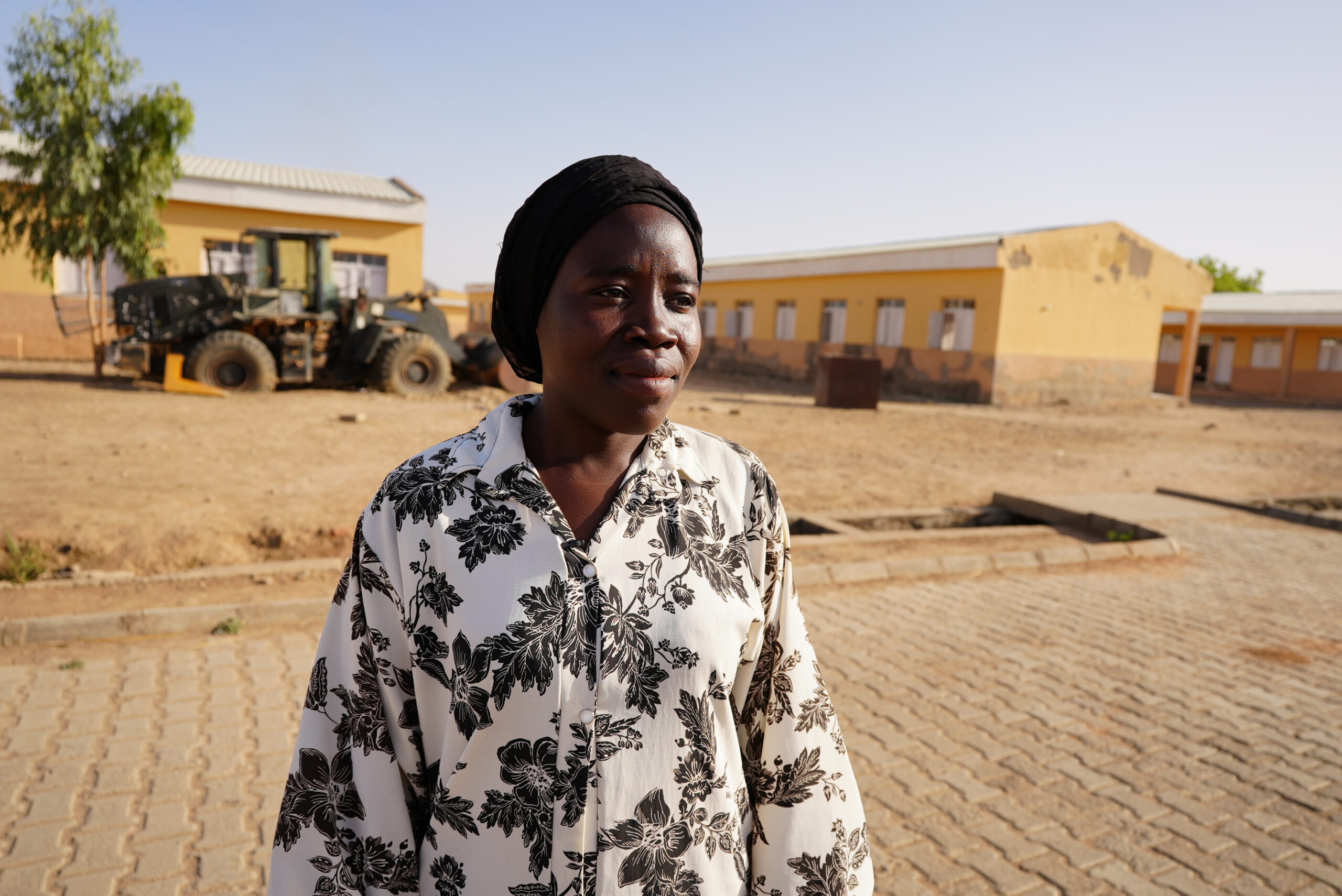 Hauwa Ishaya stands outside of Government Secondary School, Chibok on March 25. The school has been renovated since the 2014 kidnappings. (CNN)
Hauwa Ishaya stands outside of Government Secondary School, Chibok on March 25. The school has been renovated since the 2014 kidnappings. (CNN)
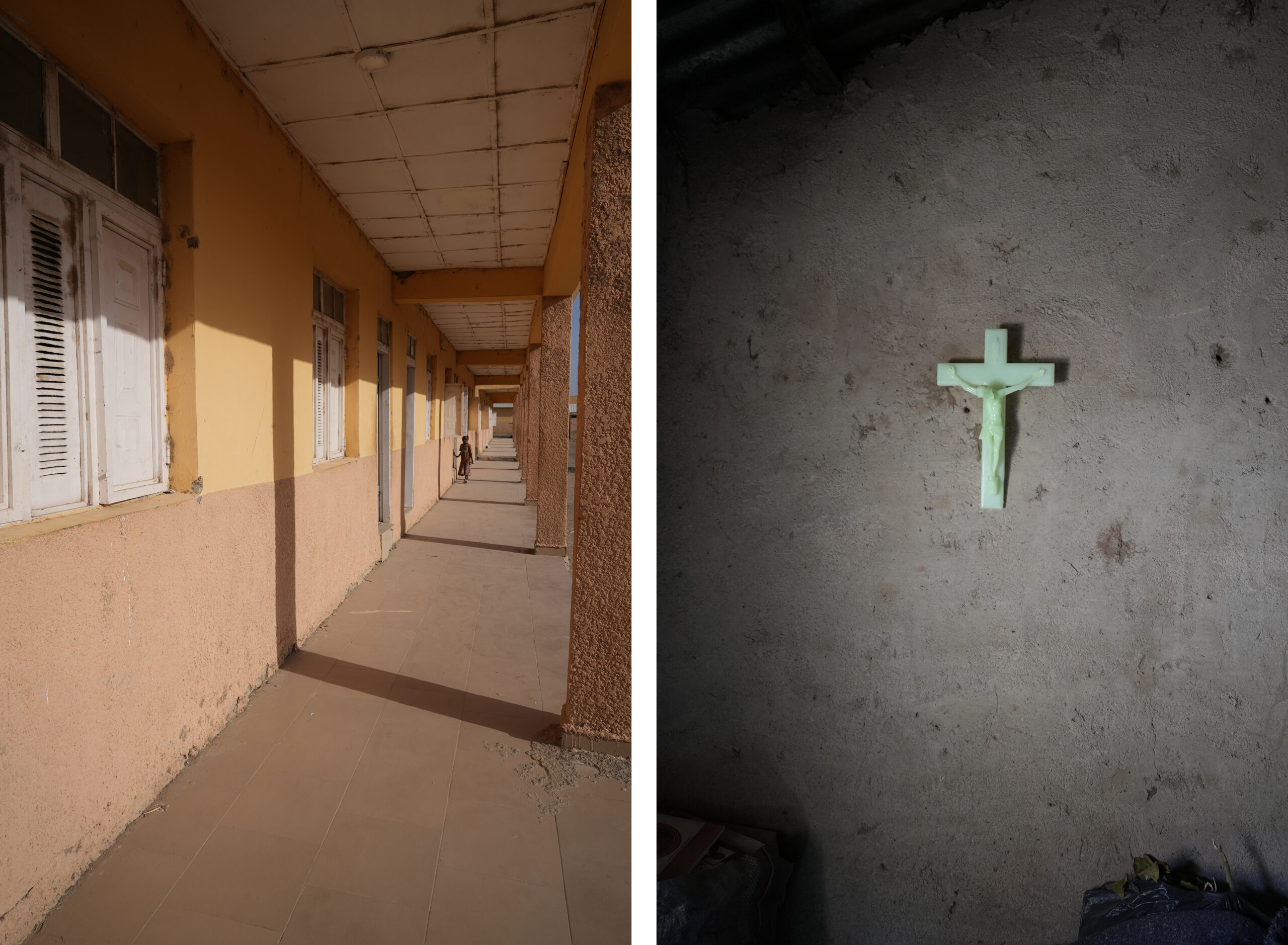 A hallway of a classroom block at government secondary school, Chibok, Borno State, Nigeria on March 25. (Right) A crucifix hangs on the wall in Hauwa Ishaya’s room in Chibok on March 25 (CNN)
A hallway of a classroom block at government secondary school, Chibok, Borno State, Nigeria on March 25. (Right) A crucifix hangs on the wall in Hauwa Ishaya’s room in Chibok on March 25 (CNN)
Sunday April 14, 2024, will mark 10 years since the infamous abductions. For Ishaya, now 27, the memory remains all too vivid and painful. In late March, she traveled 260 kilometers (about 161 miles) with CNN, back to her old school, hoping to lay the ghosts of her past to rest. Determined to further her education, Ishaya enrolled at the American University of Nigeria in Yola, studying Communication and Multimedia Design.
For northern Nigeria, little has changed. Kidnappings have continued unabated and, as CNN learned, the ongoing violence has cast a long shadow over education – of girls in particular – further limiting the possibilities in a part of the country already marked by vastly higher rates of poverty, illiteracy in girls and child marriage.
Paying with your life to be educated
The name Boko Haram, in Hausa, translates roughly to “Western education is forbidden,” reflecting the Islamist militants’ ideological opposition to secular education, particularly for girls. The abduction of the Chibok girls remains the highest profile example of the group’s targeting of schools, but it represents only a fraction of the attacks on learners and educational institutions carried out.
Between February 2014 and December 2022, according to data from international NGO, Save the Children, raids on schools have persisted across Nigeria (though the vast majority are in the country’s northwest region), with dire consequences for both students and teachers or school workers: at least 1,743 have been kidnapped, nearly 200 killed and 25 buildings schools destroyed.
While boys’ schools have not been spared from the scourge of violence, girls’ education remains particularly vulnerable because girls in this region, who are already lagging behind their peers in other parts of the country, are being directly targeted.
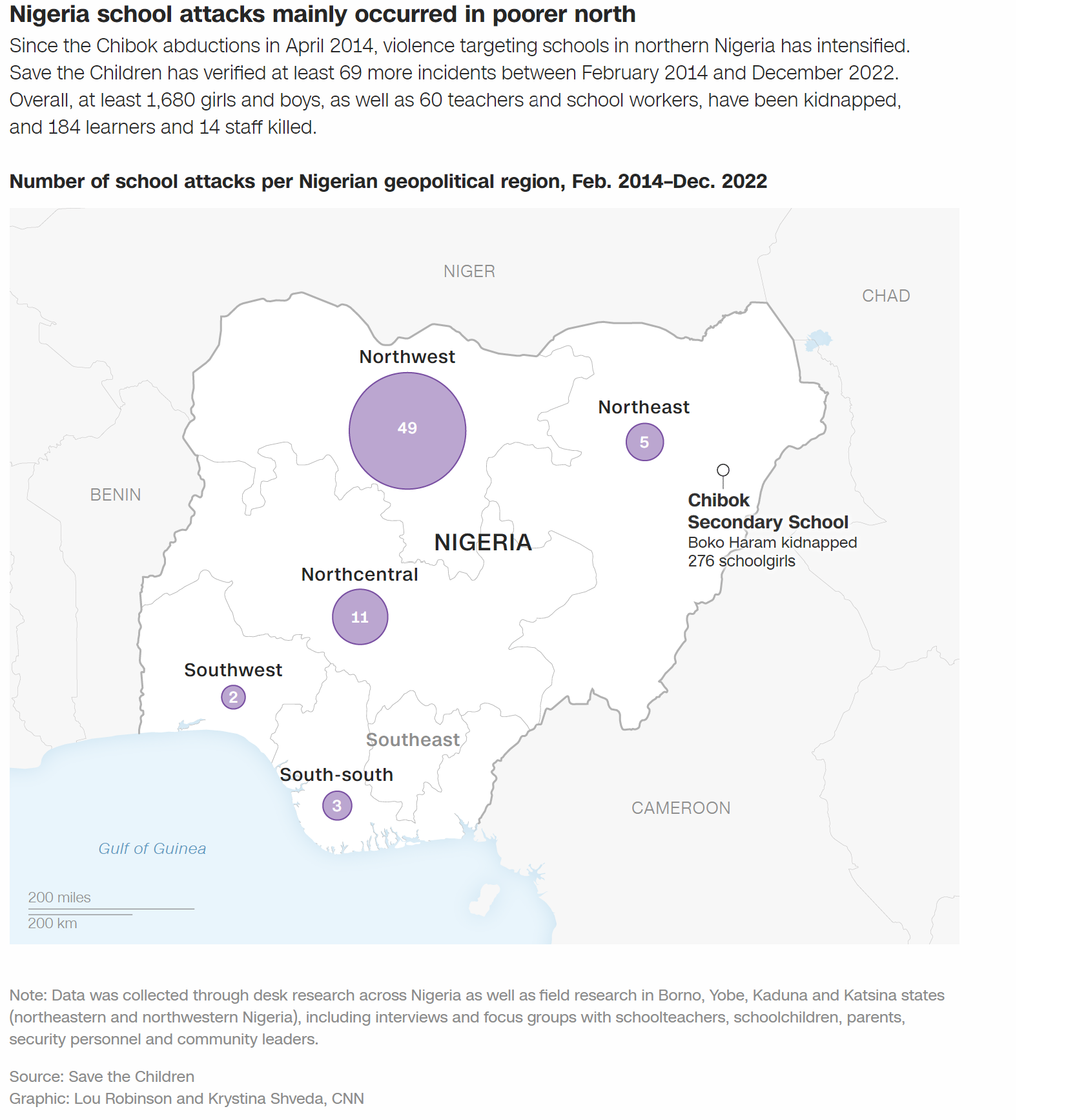
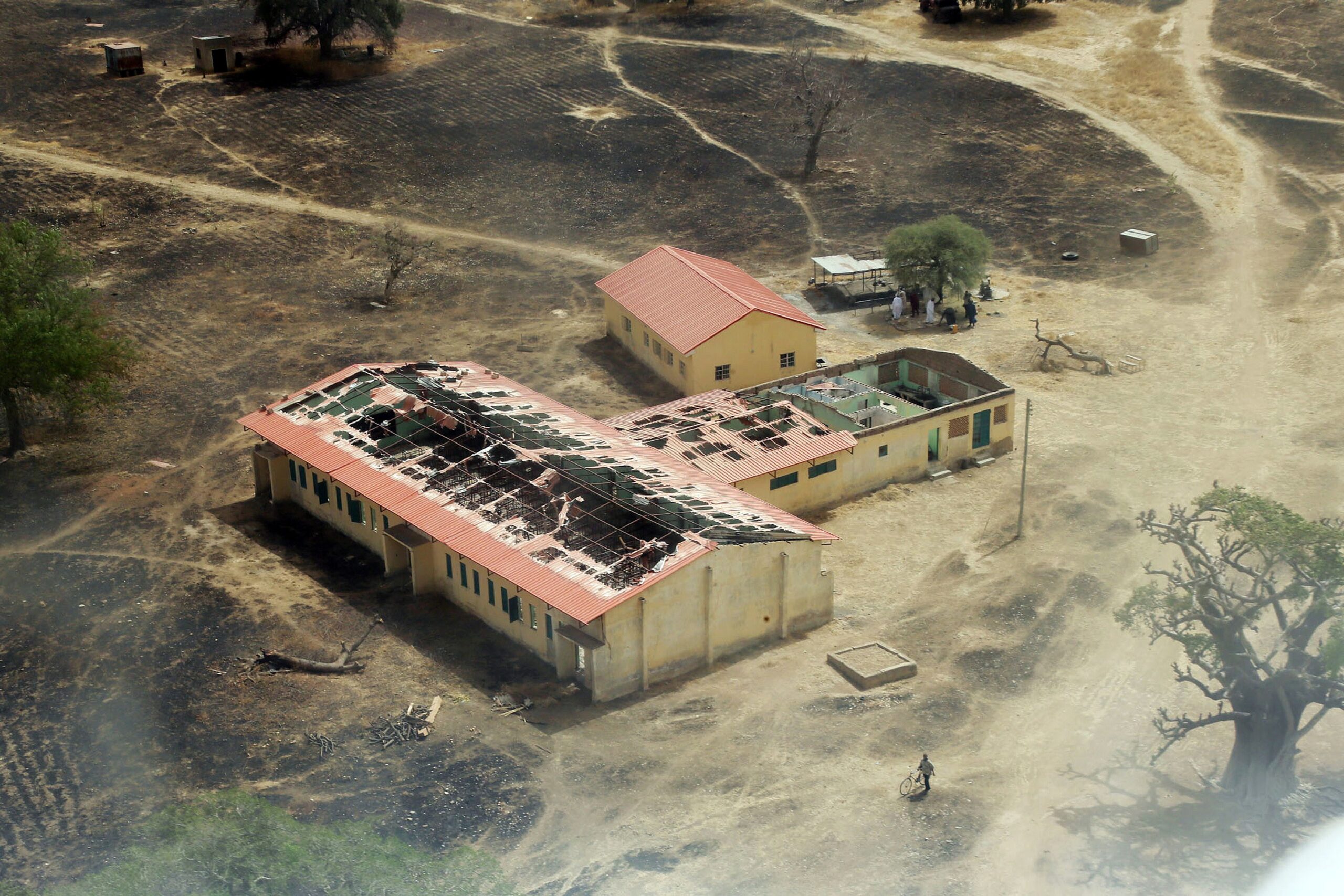 This picture, taken on March 5, 2015, shows an aerial view of the burnt-out classrooms Chibok Government Secondary School, from where Boko Haram militants kidnapped 276 teenagers on April 14, 2014. (Sunday Aghaeze/AFP/Getty Images)
This picture, taken on March 5, 2015, shows an aerial view of the burnt-out classrooms Chibok Government Secondary School, from where Boko Haram militants kidnapped 276 teenagers on April 14, 2014. (Sunday Aghaeze/AFP/Getty Images)
Girls’ enrollment in school in northern Nigeria has improved over the last decade, but according to a survey carried out by Nigeria’s National Bureau of Statistics and UNICEF in 2021, over half of women aged 15-49 in the northeastern and northwestern regions were illiterate with no education, compared to less than 1% in the southeast and 7% in the southwest. In addition, approximately half of girls in the northeast and around 40% in the northwest were not attending primary or lower secondary school, in contrast to less than 10% in the southern states.
These figures are of significance for Nigeria because, as the survey notes, literacy “is often seen as a proxy measure of social progress and economic achievement.” But they also matter for the rest of the continent and beyond. By 2030, Nigeria will have “17% of the children in Africa and 5% of the children in the world,” according to UNICEF. As the UN children’s agency put it: “Nigeria’s child population is large and growing… What happens to children in Nigeria matters significantly to regional and global development.”
“We know that when we educate women, that has a multitude of returns and economic growth,” Executive Director of the Global Coalition to Protect Education from Attack (GCPEA), Lisa Chung Bender told CNN. “Educating women is the best return on investment that any country can make. If Nigeria wants to advance… the best investment [is] getting all girls into school and having them stay in school through completion.”
The GCPEA, among other things monitors and works to end impunity for attacks on education. Of the situation in northern Nigeria, Bender noted that attacks have “really intensified.” The prevailing insecurity, she told CNN, erodes families’ trust in sending their children to school.
“When schools are not safe, all aspects of education are at risk, from teacher recruitment to student’s learning outcomes,” Bender explained. “We see some of those effects immediately, such as dropout, failure to enroll, because parents are afraid to send their girls away.”
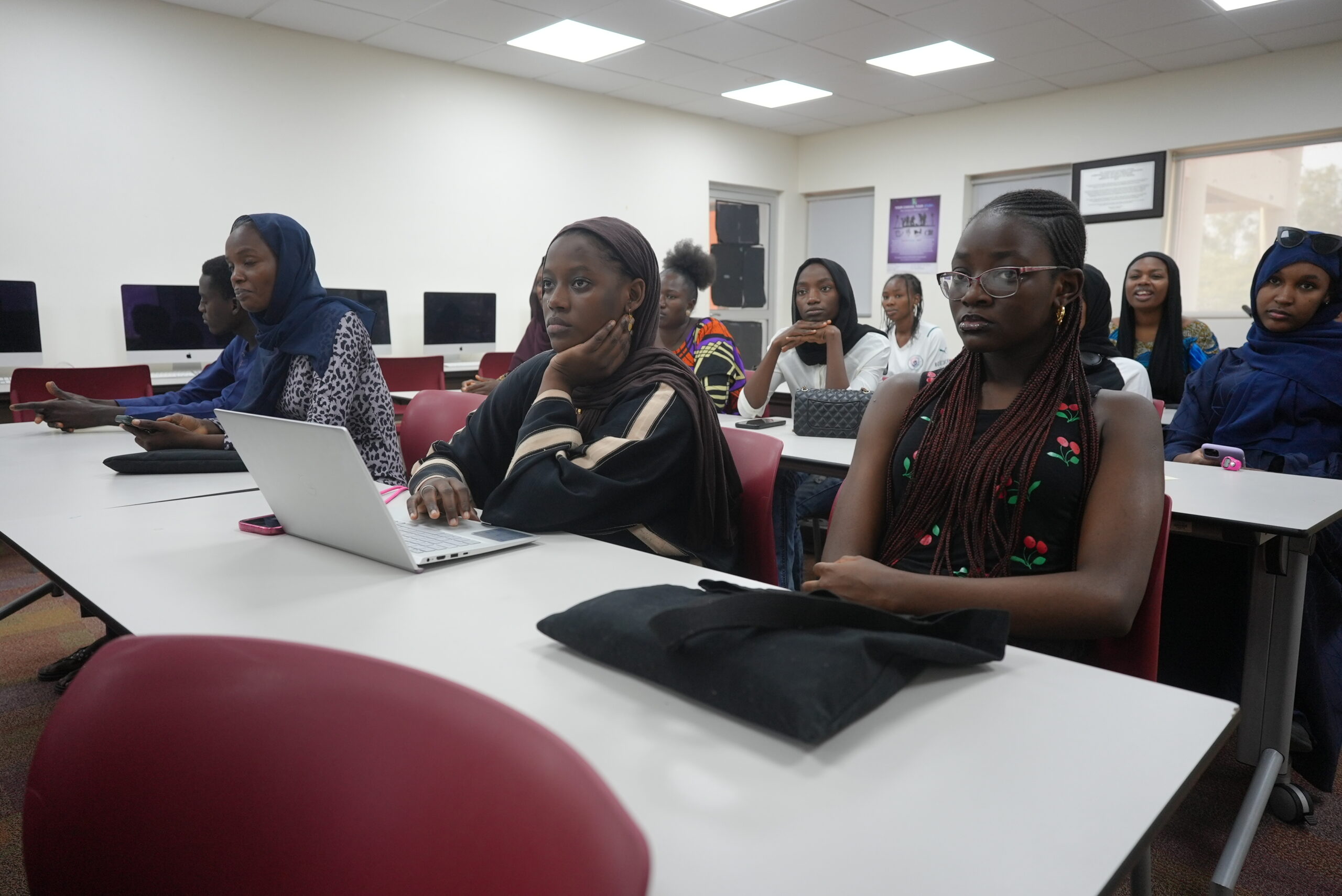 Students listen during a Comms/Media class at AUN on March 26. (CNN)
Students listen during a Comms/Media class at AUN on March 26. (CNN)
Choosing to persist with educating girls despite the very real risks can also have a psychological impact on parents, according to Oby Ezekwesili, former Nigerian education minister and one of the leaders of the Bring Back Our Girls movement.
“Mothers used to be the ones who insisted… ‘our daughters should go to school,’” Ezekwesili told CNN. “But guess what the Chibok girls tragedy did? It made the mothers feel guilty… in their mind that what they did by arguing for education for their daughter was to say, ‘pay with your life in order to be educated.’”
As for learners and teachers, the 2023 report by Save the Children found that despite the lack of “specific research on learning outcomes… schools and government officials reported massive withdrawal of learners from schools by parents. Teachers as well are reported to be resigning or simply abandoning the profession in huge numbers.”
A “continuing fear of harm on learners, teachers and parents alike is palpable,” the report adds.
Today, the threats to girls’ education have multiplied
According to UNICEF, “in March 2021, no fewer than 618 schools were closed in six northern states (Sokoto, Zamfara, Kano, Katsina, Niger, and Yobe) over the fear of attack and abduction of pupils and members of staff.”
In addition, over the past decade, the risks for learners have also multiplied beyond insurgent attacks.
The climate crisis has become a threat to girls’ education as extreme weather events – such as floods and landslides – have made some schools inaccessible or classrooms unsafe.
Criminal gangs have also been exploiting the vulnerabilities exposed by extremist groups. This has seen the violence spread to northcentral Nigeria and led to the rise of a kidnapping-for-ransom industry, according to Save the Children. In fact, of the 28 attacks on schools that the NGO analyzed between April 2014 and January 2021, the overwhelming majority (23) were by armed bandits, “driven by the desire for monetary gains and fueled by unemployment, especially youth unemployment.”
And so, the kidnappings have continued, under an ever-dimmer spotlight. On March 7, more than 100 students, mostly girls, were reportedly taken by criminal gangs from a school in Kuriga, in Nigeria’s northwest. Two days later, 15 more children were abducted from a boarding school in Sokoto state, also in the northwest, according to Human Rights Watch.
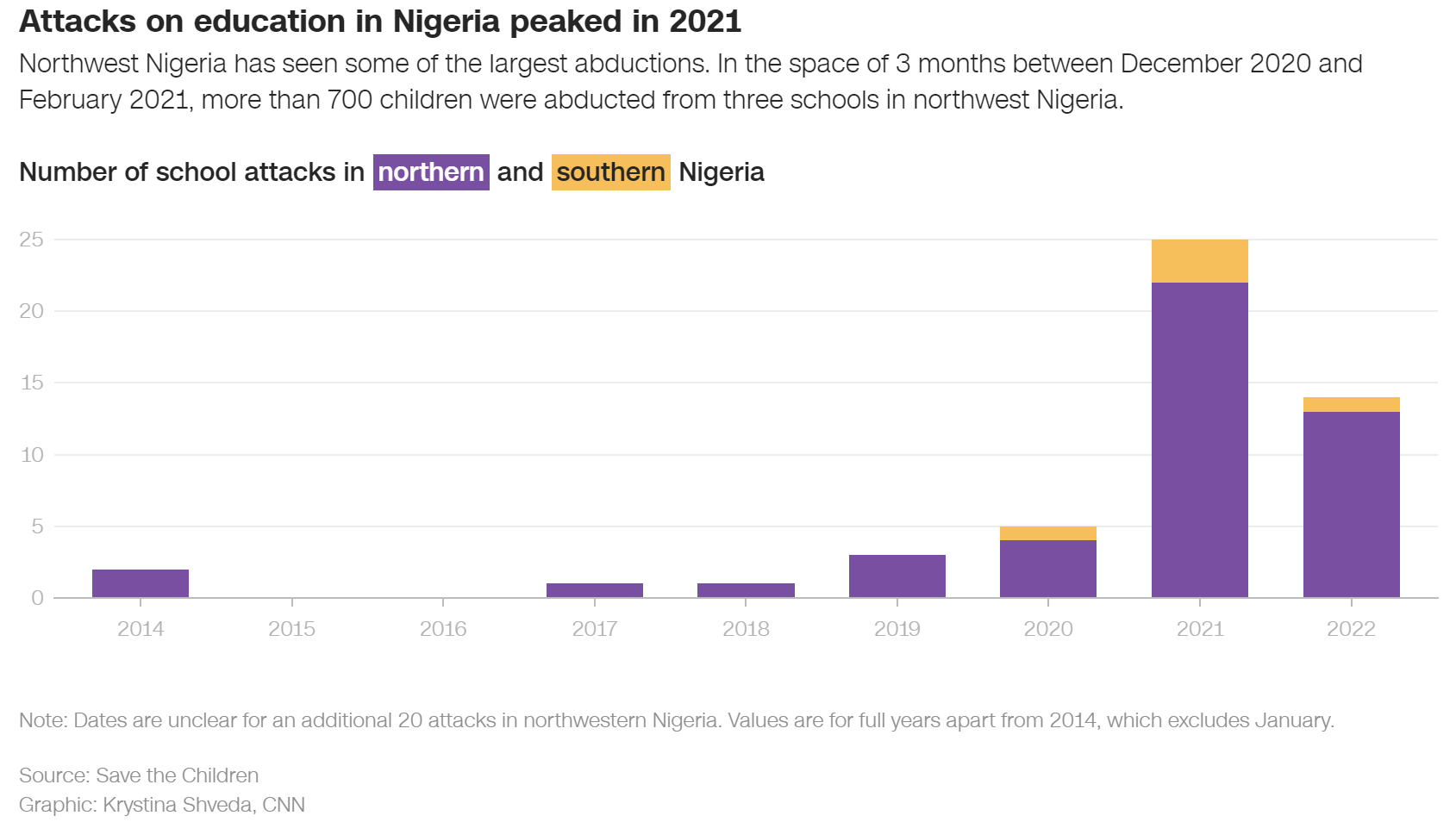
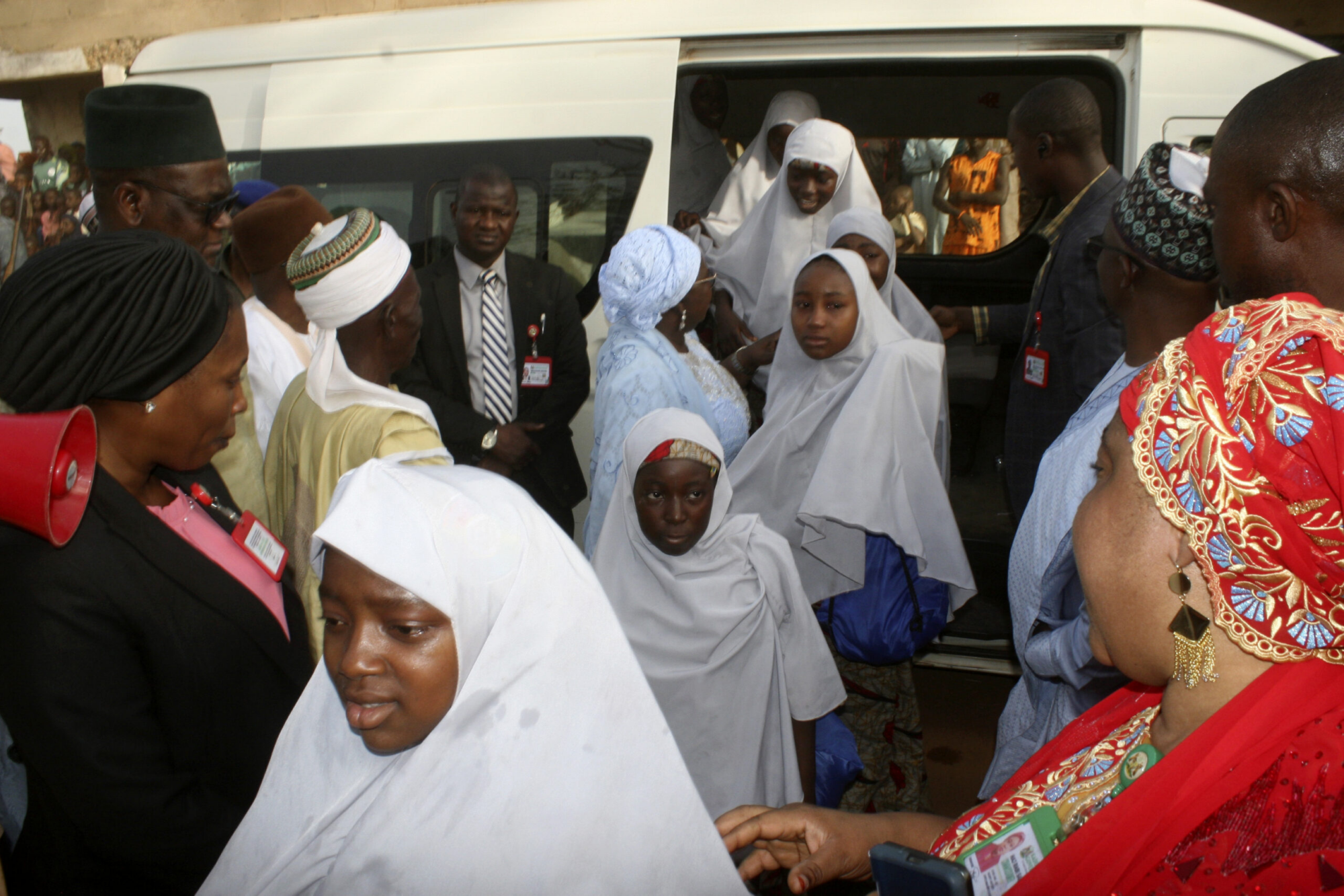
Recently freed students of the LEA Primary and Secondary School Kuriga being reunited with their parents, Thursday, March 28, 2024. (AP Photo/Olalekan Richard)
As the attention has waned, so too, experts say, have the efforts of the Nigerian government to seek a long-term solution to protect the country’s school children and teachers, and ensure continued safe access to education.
The Safe Schools Declaration (SSD), an international commitment to protect educational institutions during armed conflict, was launched in 2015 and ratified by Nigeria in 2019. The declaration is just one of several policies and programs introduced or adopted by multiple Nigerian administrations, and the country has launched a national plan for financing safe schools, but positive results are yet to be seen, especially in rural areas, Bender told CNN.
“What happened at Chibok 10 years ago should have served as a lesson for the Nigerian authorities to put in place measures to protect schools and prevent mass abductions,” Amnesty International’s Isa Sanusi told CNN. Instead, Sanusi, who is the country director for Nigeria, said: “The authorities failed to learn from that horrific incident as more and more schools [have been] attacked and children abducted, with many still in the custody of gunmen.”
“The government used to fine parents for not sending their children to school. Who is going to fine the government?”
Nigerian activist, Aisha Yesufu
Aisha Yesufu, a Nigerian activist, and co-convener of the Bring Back Our Girls movement, echoed Sanusi’s words: “The Chibok kidnappings alone should have brought the nation together to say, ‘enough is enough’ but unfortunately, we didn’t.”
Speaking to what she says is the hypocrisy of a government that, on the one hand, wants to improve enrollment but on the other does not protect children from harm when pursuing education, Yesufu shared an anecdote: “One of the Chibok parents said in 2014 that the government used to fine them for not sending their children to school. She asked: ‘Who is going to fine the government?’”
Successive governments have struggled to grapple with school abductions and every Nigerian president since 2014 has had to confront mass kidnappings on their watch. The reasons for this are multiple and complex, ranging from widespread poverty to inadequate cooperation between Nigeria’s security agencies. Speaking to Al Jazeera, research analyst at the Abuja-based Centre for Democracy and Development, Afolabi Adekaiyaoja said: “There needs to be a stronger synergy in communal buy-in in securing facilities and also escalating necessary intelligence … There should be a renewed focus on necessary and frankly overdue police reform and a stronger synergy between intelligence and security agencies.”
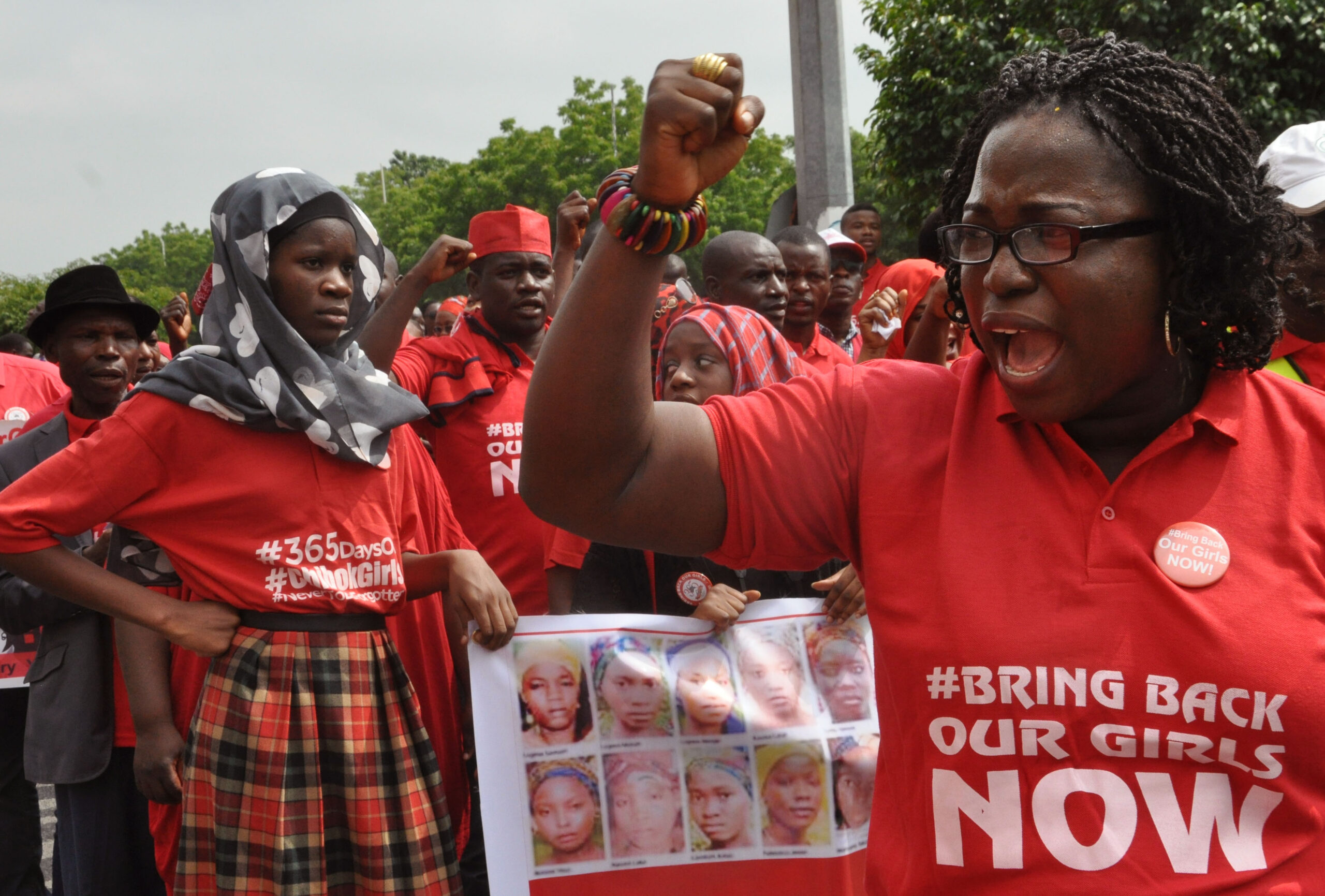 People take part in a ‘Bring Back Our Girls’ march outside of the presidential residence in Abju, Nigeria, in July 2015. (Olamikan Gbemiga/AP)
People take part in a ‘Bring Back Our Girls’ march outside of the presidential residence in Abju, Nigeria, in July 2015. (Olamikan Gbemiga/AP)
Current president, Bola Ahmed Tinubu, who came to power last year, has campaigned to end the country’s security crisis and vowed in March “that his administration is deploying detailed strategies to ensure that our schools remain safe sanctuaries of learning, not lairs for wanton abductions.”
CNN reached out to the education and information ministries for comments on implementing the SSD and efforts to keep schools safe in the region but had not received a response by the time of publication.
For now, as Nigerians continue to search for answers from their government, parents like Lawan Zannah weigh the value of education against the risks.
Zannah, whose second daughter Aisha was 16 at the time of her abduction and is still missing nearly a decade later, told CNN that after the incident he initially kept his remaining 14 children who were of school age at home.
“When this incident happened, I vowed I would not allow my children to go to school,” he said. “But as time went on and I found healing and comfort, I realized that education is good.
Zannah said his children are now back in school, getting the education at primary and junior secondary level that millions of Nigerian children are still not accessing, many of them girls.
As for Ishaya, she is looking forward to finishing her university course and then hopes to work in media. Her abduction, however, continues to loom large. “When I think of what my life could have been like, I feel sad,” she said.




